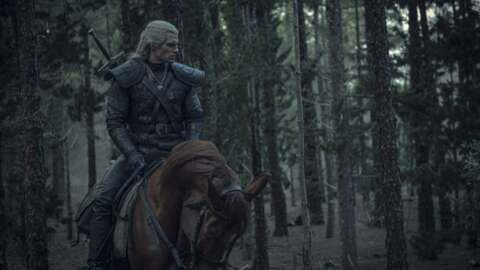What The Witcher Season 2 Finale Means For Netflix's Fantasy Series Moving Forward
Netflix's The Witcher Season 2 sets up all kinds of chess pieces ahead of Season 3.
We looked at the first six episodes of The Witcher Season 2 for our review, coming away with the conclusion that this season is overall much stronger than the first, maturing the series in almost every way. With the last two episodes under our belts, that only feels more right. Spoilers follow for The Witcher Season 2.
Who is the Deathless Mother?
As we head into the final quarter of the season, everything is coming to a head. Since early this season, three sorceresses--Yennefer of Vengerberg, Fringilla the Nilfgaardian mage, and Elven mage Francesca Findabair--had encounters with a being we come to know as the Deathless Mother or Voleth Meir. This character doesn't appear in the books or games, but appears to be inspired by them and their sources.
Baba Yaga, in addition to being a nickname the Russian mob uses for John Wick, is a character found throughout Slavic mythology. Baba Yaga is a powerful witch who lives in a dilapidated hut that sits atop chicken legs, with the house often depicted as having eye-like windows. Baba Yaga sometimes appears as three old women instead of just one--just like the Crones in The Witcher 3: Wild Hunt.
So while Voleth Meir is an original character, she fits well into the arc of this season and the characters she interacts with, helping to set much of the stage for the series moving forward.
God Emperor Duny
Also playing into this is the final twist of the season, one that fans of the games and books will have seen coming. Nilfgaardian emperor Emhyr Van Emreis, also called The White Flame, isn't just some faceless ruler we've never met. He's Ciri's father, Duny. We first met him in Season 1 when he had the face of a hedgehog. Ciri's mother, Pavetta, married him, and the two gave birth to Ciri together. Duny and Pavetta escaped Cintra before it was sacked by Nilfgaard, with Pavetta disappearing in the process. Now we have an idea of why Nilfgaard's attack on Cintra was so effective.
As Emhyr Van Emreis introduces himself, he also reveals a crucial piece of information that helped to free Voleth Meir: it was his order that brought about the death of the first Elven baby in many years, and its mother Francesca's anguish that helped push Voleth Mier over the edge.
The Wild Hunt
Voleth Meir feeds on pain and misery, Geralt explains, and between Francesca's pain, Yennefer's emptiness at her loss of magic, and Frangilla's ambition, she is able to escape her confinement, possessing Ciri in the process.
In Ciri's body, Voleth Meir kills several witchers and then opens a portal, pulling in a host of dragon-like monsters that slaughter a bunch more of the monster hunters. As Geralt and the witchers fight, Ciri pulls herself, Geralt, and Yennefer through a portal to another world where we meet the Wild Hunt for the first time. The Wild Hunt was at the center of the conflict in The Witcher 3, as the game's title would suggest, so fans will be quite familiar with them. We know very little about the Wild Hunt in the context of the show at this point, but they're a group of supernatural warriors that have apocalyptic connotations.
Family is Chosen
One strong element of the book series is the "blended family" nature of the relationship between Ciri, Yennefer, and Geralt. All three are orphans of a sort, people who have been trained or used for their power. Yennefer's place in this has been in question throughout this season. However, Yennefer finds her magic again when she sacrifices herself for Ciri, suggesting that the key to her magic is in generosity and care rather than in power and destruction.
This makes sense for Yennefer's arc--her story has been about her sense of self. Before she had magic, she was an impoverished girl with a congenital hunchback. When she lost her magic at the end of Season 1, she felt again like she was nothing. Her emptiness led her to chase power through dangerous means, and it wasn't until she began to make selfless moves that she started to become herself again.
Politics All Around
Meanwhile, all manner of gears are moving about on the Continent. This season introduced us to Dijkstra, the spymaster for the Northern kingdom of Redania. We only see him a few times, but he's the kind of character that feels like he'd be at home in Dune. It's almost immediately clear that he's a plans-within-plans kind of guy, and he's directed King Vizimir to consider the idea of forcing Ciri into marriage.
Emhyr Van Emreis knows Fringilla and Cahir are lying to him. We don't see their fates, but it's clear that despite their prior allegiance to Nilfgaard, they'll be looking for new homes soon. The emperor, meanwhile, is focused on finding Ciri.
The Brotherhood of Sorcerers, too, is interested in Ciri and in the condition of the Elves, as are the Elves themselves when they find out that she has Elder blood--that is, that she's part of a particular ancient Elven bloodline.
All of this sets the stage for what is to come. Ciri is the target of many factions in the world of the Witcher and is depending on Geralt and Yennefer to teach her how to come into her own. Meanwhile, prophecies and beings from other worlds are bearing down as well. These last two episodes went a long way toward setting up not just Season 3, but the rest of the show to follow, while also bringing together all the major plot threads from this season.
Got a news tip or want to contact us directly? Email news@gamespot.com







Join the conversation